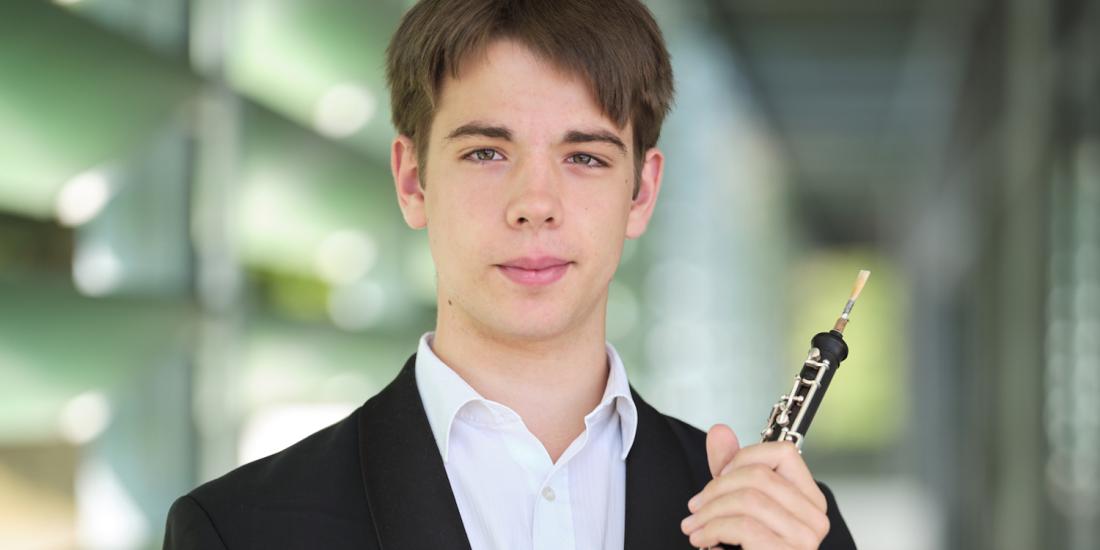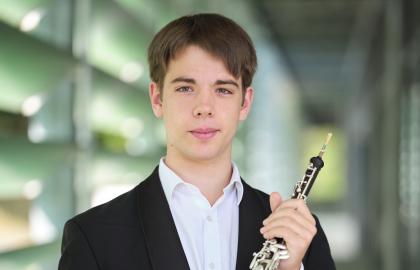Why did you choose the oboe?
That choice actually happened pretty much by chance. I had been playing the violin since I was 4, and at the age of 5, an older cousin came to our house once to babysit my brothers and myself. He plays the oboe very well in his spare time and had brought his instrument along with him. One by one, we were allowed to try it out and I was the only one who could more or less get a sound out of it. I immediately fell for it and so wanted to learn to play the oboe. At first, my parents thought it was just a whim, but I kept insisting. They contacted a private oboe teacher and things then started from there.
What is so unique about playing the oboe?
I would say that its uniqueness lies in its drawbacks – it is a very complex instrument and the reed (the mouthpiece that is placed at the top of the instrument) is a source of great frustration. Oboists build those reeds themselves and wood is a living material that can change from day to day. If a reed sounds good one day, it doesn't mean it will sound good the next. So as an oboist you have to worry all the time, build a lot of reeds, try out different kinds of wood, and then find that one best reed for the concert. I also feel that the oboe is an instrument with a very distinctive sound. It is rather limited in terms of dynamics and tonal range, but it has a sound that, without too much virtuosity or particularity, can go straight to your heart.
Can you briefly explain the programme?
The programme consists of several works from the chamber music repertoire for the oboe. The instrument is not seen all that much in this form, so I am very pleased to be able to present an entire concert of this type of music. The quartet by Mozart is perhaps the best known of the works in this programme. During one of his trips to Munich, Mozart met a famous oboist who reportedly was a highly virtuosic player. The work itself is technically challenging, especially for the oboes of the time. It is possible that only few musicians could play it. Nowadays, the quartet forms part of the 'normal' repertoire of an oboist, but that doesn't mean that it's easy, especially when it comes to ensemble playing.
The quartet by Martinů was created in 1947. Martinů emigrated to the United States because of World War II, but he still missed his homeland of the Czech Republic and in the period after the war, he wrote some of his finest works, full of sadness and melancholy. The quartet for oboe is one of those works and is full of sweet harmonies and extended slurs and legato passages. As a composer, Théodore Dubois is still relatively unknown. A native of France, he won the prestigious Prix de Rome in 1861. Amongst other things, he was the choirmaster at the Basilica of Saint Clotilde in Paris, where César Franck was organist at the time. In addition, he was first a teacher and later director of the Paris Conservatory. Overall, he produced a diverse body of works. The quintet for oboe, violin, viola, cello and piano is hardly ever performed, but I think the work certainly deserves a place in the repertoire.
You've brought some friends along with you. How does it feel to make music with them?
As it happens, I have worked with most of these musicians on several occasions. From the very first time we played music together, it clicked really well. It's a great feeling to be able to share the stage with people you enjoy being with, both musically and personally.
What is the biggest dream you would like to fulfil with this ensemble?
The concert in Bozar is the first one we are playing with this ensemble. Since everyone is quite busy and I live abroad, it is not easy to schedule concerts. We'll simply see what comes our way. But spontaneity is particularly nice.


